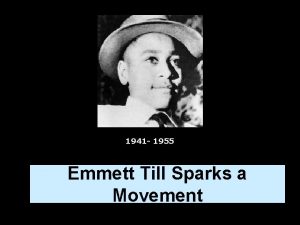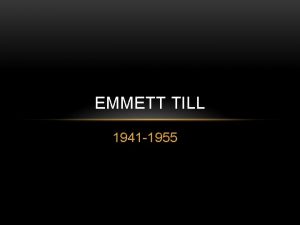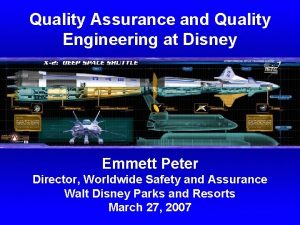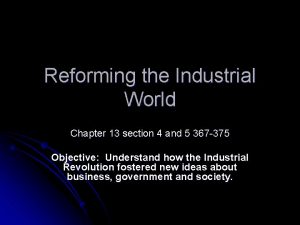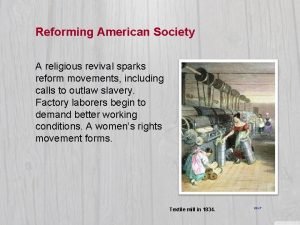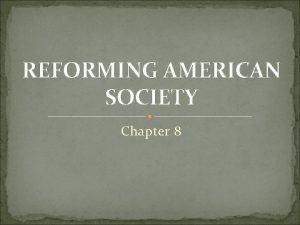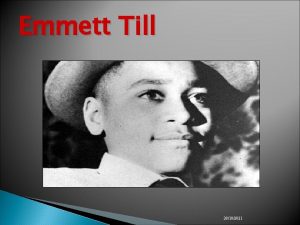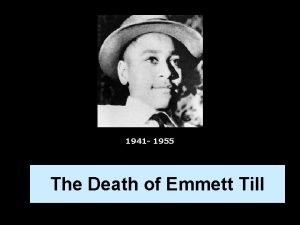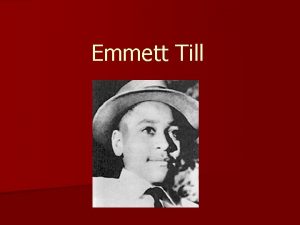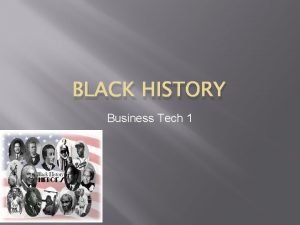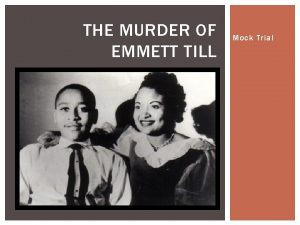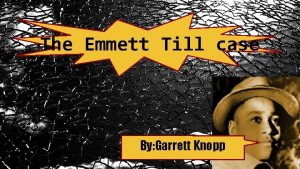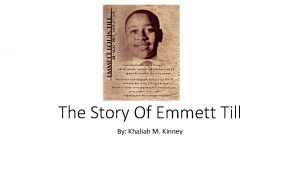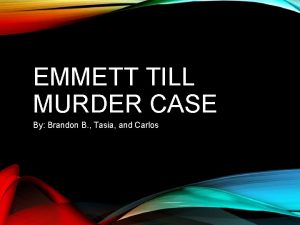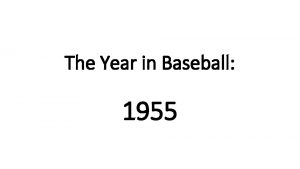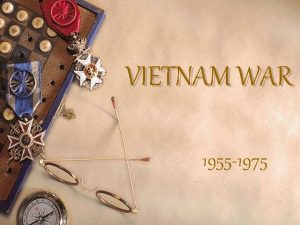1941 1955 Emmett Till Sparks a Movement In

















- Slides: 17

1941 - 1955 Emmett Till Sparks a Movement

• In 1955, Emmett (aged 14) went to spend the summer with family in Money, Mississippi. • He and a group of teenagers went to Bryant's Grocery and Meat Market for refreshments to cool off after a long day of picking cotton in the hot sun.

Reverend Moses Wright

The Incident • When he showed the teenagers a picture of a white girl who was one of his friends back home and bragged that she was his girlfriend, one of them said, "Hey, there's a [white] girl in that store there. I bet you won't go in there and talk to her. " • Emmett went in and bought some candy. As he left, he said "Bye baby" to Carolyn Bryant, the wife of the store owner, according to some accounts. Others say he whistled at her.

Carolyn Bryant

Bryant Grocery Where the “crime” took place.

• Four days later, Roy Bryant and his half brother J. W. Milam kidnapped Emmett from the house of his great uncle, Moses Wright. • They brutally beat him, took him to the edge of the Tallahatchie River, shot him in the head, fastened a large metal fan used for ginning cotton to his neck with barbed wire, and pushed the body into the river.

Aftermath • Emmett’s decomposed corpse was pulled from the river three days later. • His great uncle identified the body from a ring with the initials L. T.

• The men were arrested and tried in a segregated courthouse in Sumner, Mississippi • Moses Wright pointed them out in court when asked to identify the men who had taken his nephew. His bravery encouraged other blacks to testify against the two defendants. All of them were hurried out of the state after their testimony.

Acquittal • The men were acquitted after the jury deliberated for 67 minutes.

Confession • In January 1956, the two men sold their story to Look Magazine for $4000. In it they confessed to killing Emmett. They would never serve a day in jail

Emmett’s Open Casket This is how my body looked after being flogged, shot, and left in a river.

Emmett Till’s lynching was important to the Civil Rights Movement • It was important to the Civil Rights Movement because it publicized how African. Americans were being treated. • Also writers such as William Bradford Hue publicized the Emmett Till case. • In the case to men were charged for the murder of Emmett Till, they were not proven guilty.

"Have you ever sent a loved son on vacation and had him returned to you in a pine box, so horribly battered and water-logged that someone needs to tell you this sickening sight is your son -- lynched? " -- Mamie Bradley

"Your fathers will turn over in their graves if [Milam and Bryant are found guilty] and I'm sure that every last Anglo. Saxon one of you has the courage to free these men in the face of that [outside] pressure. " -- Defense attorney John C. Whitten, to the jurors in his closing statement

Civil Rights • Basic rights guaranteed to every citizen by the constitution

Civil Rights Movement • A time period (1955 -1968) when African Americans fought for their civil rights
 Emmett sparks
Emmett sparks Bryants store money mississippi
Bryants store money mississippi God be with you till we meet again images
God be with you till we meet again images Krste asanovic
Krste asanovic Jon emmett
Jon emmett Emmett school district bond
Emmett school district bond Hollywood silver fox farm v emmett
Hollywood silver fox farm v emmett Emmett mitchell
Emmett mitchell Disney quality assurance
Disney quality assurance Sparks police report
Sparks police report Reforming the industrial world chapter 9 section 4
Reforming the industrial world chapter 9 section 4 Wallace community college scholarships
Wallace community college scholarships Religion sparks reform chapter 8
Religion sparks reform chapter 8 Religion sparks reform
Religion sparks reform Chapter 8 section 1 religion sparks reform
Chapter 8 section 1 religion sparks reform Arcs and sparks
Arcs and sparks Guten tag ich heiße uta
Guten tag ich heiße uta Sparks family tree
Sparks family tree
